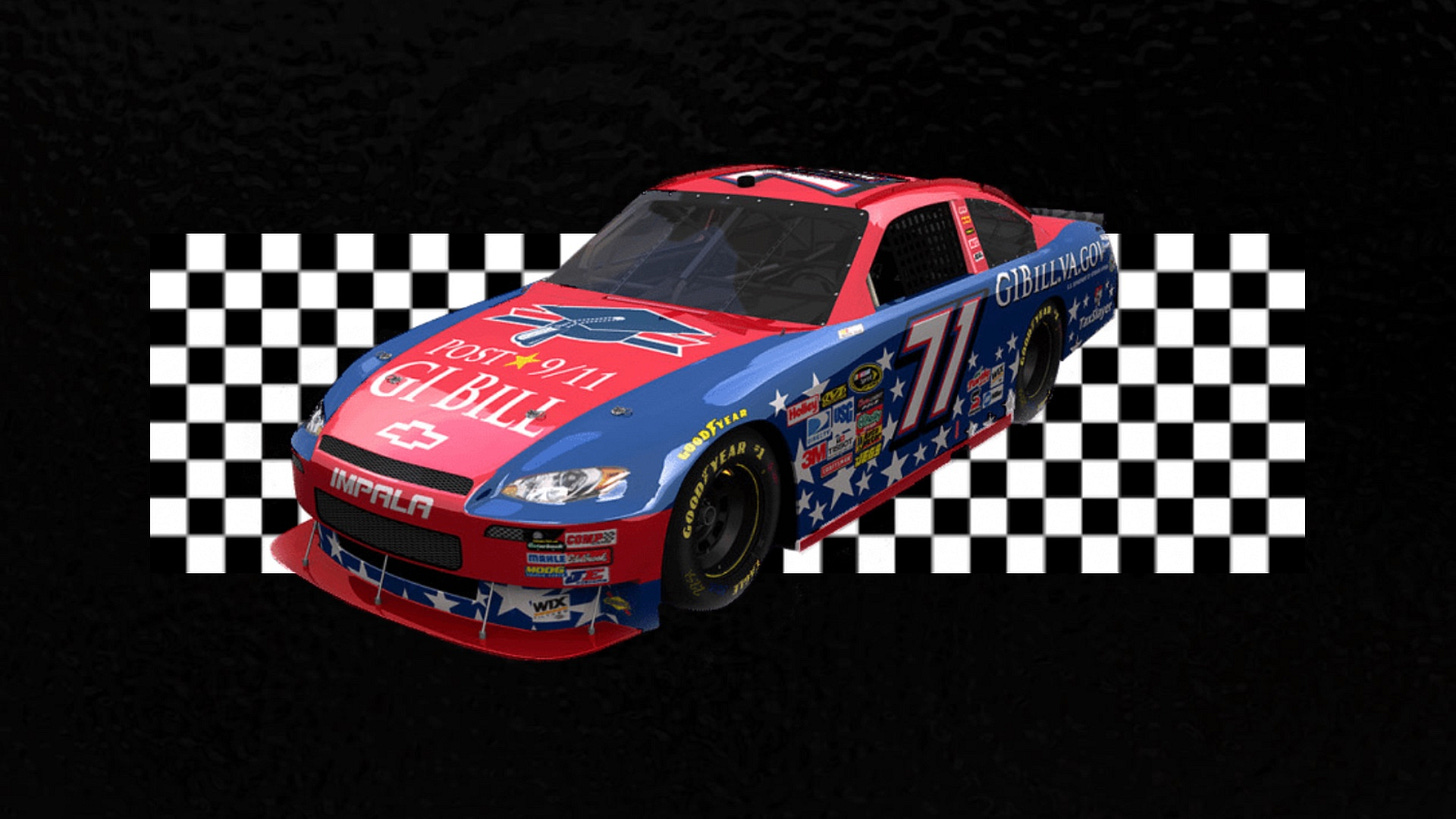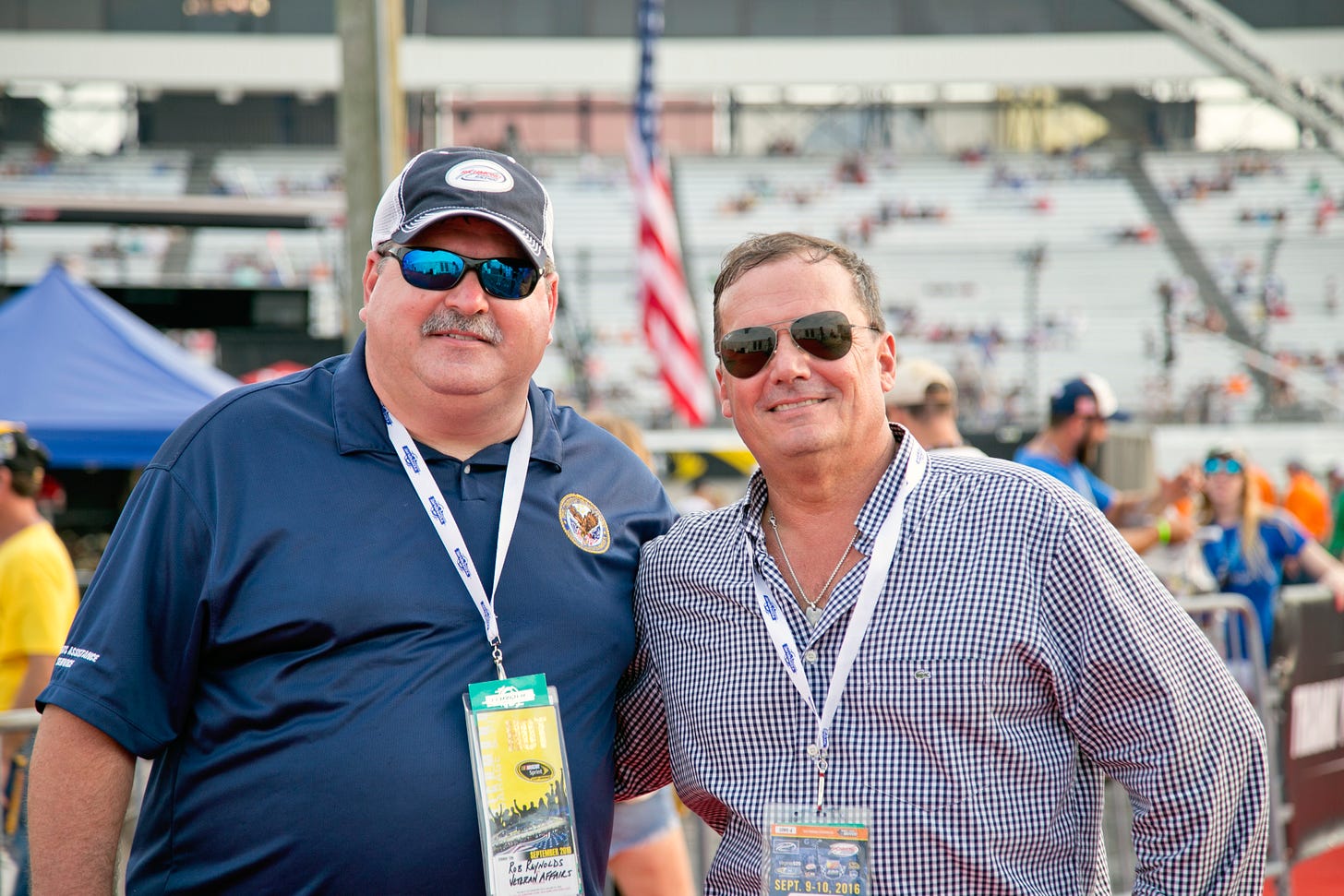Inside the VA's Bizarre Relationship with NASCAR
Vroom! Vroom! goes the G.I. Bill car.
In 2011, U.S. Rep. Betty McCollum sought to get the government out of the race car business.
Specifically, the Minnesota Democrat drafted an amendment to ban the feds from sponsoring NASCAR events. Her legislation was in reaction to a recent revelation, namely that the Department of Veterans Affairs (VA) had sunk $200,000 to have a G.I. Bill graphic plastered on the side of Landon Cassill’s souped-up Chevrolet. (As part of the deal, Cassill’s car did burnouts in front of the VA’s Washington headquarters.)
The VA later sunk an additional $250,000 to sponsor a race in Richmond, Virginia. These two expenditures ate up half of a $1 million allocation to promote veterans’ educational benefits. (While this spending may seem excessive, it pales in comparison to the Department of Defense (DoD), which has sunk hundreds of millions of taxpayer dollars to promote the military to NASCAR fans.)
Despite these questionable expenditures on race cars, McCollum’s legislation died faster than a rusty engine with a faulty alternator.
A VA spokesperson told me that the department hasn’t sponsored a race since 2011. But in 2015, the department rekindled a relationship with NASCAR, and began sending officials to races. (This work continued through at least 2020, when a government crew turned up at the New Hampshire Motor Speedway.)
This public-private partnership has been pegged as critical to reaching the veteran audience. Officials have repeatedly pointed to a 2012 survey, conducted by NASCAR, which suggests that 18 percent of NASCAR fans have prior military experience. While it may be true that these races provide a vital opportunity for the VA to connect veterans with their hard-earned benefits, a VA spokesperson declined to provide any details on what, if anything, this partnership has yielded.
Indeed, some former VA officials contend that the VA-NASCAR partnership has served as little more than an unethical perk for some of the department’s most powerful officials.
The federal government has long banned gifts when given by a “prohibited source" or if provided only because of one’s official position. (The feds generally defines a “prohibited source” as one that could see special treatment from the government.)
These rules, while somewhat murky, have plunged many officials in hot water, including former President Donald Trump’s first VA Secretary, David Shulkin.
During a July 2017 work trip to Europe, Shulkin improperly accepted a gift — Wimbledon tennis tickets. He also misspent taxpayer money and misused department resources, according to the VA’s Office of Inspector General. The trip — which clocked in at over $120,000 — also featured Shulkin’s wife, who was improperly deemed an official guest. Shulkin’s ethical lapses, while certainly serious, were quickly magnified by his enemies on the inside, who were eager to push a more radical VA privatization agenda. In the end, this scandal is what led to his ouster.
An eerily similar but previously undisclosed story played out with NASCAR and the VA’s Acting Undersecretary for Benefits, Tom Murphy.
Murphy is one of dozens of VA officials who’ve attended NASCAR events in recent years. Most were lower-level bureaucrats with a job to do, namely set up a booth and help vets secure benefits. Others, like Murphy, were of a higher status. And their presence, at times, appeared to be more about pleasure than business.
Documents obtained through the Freedom of Information Act show top VA officials nailing down a new NASCAR “contract” in late 2014, after McCollum’s political brouhaha over the partnership had died down.
In early 2015, two senior officials, Rob Reynolds and Jamie Manker, spoke in depth about the plan. “Trying to move forward on NASCAR and wanted your thoughts as to possibility of a chance,” Reynolds messaged Manker that April.
“How much $$ we talking,” Manker responded. The conversation then appeared to have moved onto a phone call.
Manker, now retired, was then the Chief Financial Officer for the Veterans Benefits Administration (VBA). Reynolds, now director of the VA’s Roanoke Regional Office, previously served as the National Commander for the Disabled American Veterans (DAV). (After joining VA, Reynolds got in hot ethical water for retaining ties to DAV, a potential conflict of interest.)
By May 2015, some sort of NASCAR agreement had been hammered out. That month, Reynolds offered four VIP tickets to a fellow senior VA official, as he couldn’t use them. “If you can go awesome,” Reynolds wrote, “especially to be able to see it in the club box.”
Internal emails, as well as publicly available VA photos, document a slew of senior officials attending NASCAR races over the following years, including Reynolds, Manker, and Murphy. Two former VA officials recalled Murphy projecting pictures from the races on his office television, and boasting about the cool experience. “These trips looked more like fun than work, and they bothered me,” one official told me.
By 2017, the VA had a presence at 11 NASCAR races across the country. Internal agency documents record thousands of “interactions” from these races, but don’t make clear whether this work resulted in more vets getting benefits.
Meanwhile, top officials got fun perks. Manker, for instance, met professional drivers, waved the race flag, sat in on team meetings, and was recognized as an “honorary race official.”
In November 2017, Murphy flew from Washington D.C. to Phoenix for a NASCAR Veterans Day event. Documents suggest that he violated numerous rules on this trip, including by flying top class travel, a move he explained in documents as part of an automatic upgrade enabled by his frequent flyer points.
What raised the most eyebrows, however, was the presence of Murphy’s wife, and their acceptance of VIP or “hot passes.”
Murphy was at this 2017 NASCAR event for three days. His travel included a tour of the local VA facility and the VA mobile vet center. But he also enjoyed access to the track’s presidential suite, where he watched races.
Reynolds also went to numerous NASCAR events, including at least two in Richmond. Documents suggest that during one of these trips, Reynolds violated rules when he stayed at a hotel nicer than what the VA allows. Reynolds explained this move by claiming that “no other hotel was in approximate area that was within lodging amounts.” (In a separate September 2018 trip, Reynolds again appeared to exceed his hotel voucher amount.)
It’s been difficult to nail down exactly how many taxpayer dollars supported this partnership. Internal documents I obtained show tens of thousands of dollars spent for officials on travel, lodging, and food alone. I also found that certain elements of this partnership were organized through a contractor, Duty First Consulting. In recent years, this company has secured millions in VA contracts, though a department spokesperson estimated that no more than $100,000 of this money went to NASCAR-specific expenditures.
By 2018, the VA’s (highly flawed) Office of Accountability and Whistleblower Protection was investigating whether “VBA senior leaders have attended VIP NASCAR events in their official capacity using VBA funds or through vendor contracts.” A document further suggest that this investigation involved numerous executives who’d attended NASCAR events, but did not specify their names.
In February 2019, the VA proposed that Murphy be suspended for 10 days, specifically for securing a NASCAR pass for his wife worth $520. According to internal documents, Murphy accepted this gift without seeking input from ethics officials.
That April, however, Trump’s second VA Secretary, Robert Wilkie, overturned the ruling. In turn, Murphy continued to thrive professionally and today serves as one of the VA’s most powerful officials.
Oddly enough, there are other examples of strange VA-NASCAR relationships.
In 2016, the VA entered into a five-year agreement with Flow Health, a sketchy AI healthcare company owned by a disgraced former NASCAR owner. Weeks later, the VA terminated the partnership on the grounds that it could violate “the VA’s longstanding commitment to our veterans to protect their data.” (Earlier this year, the VA’s Inspector General found other troubling issues with the Flow deal, including that unnamed VA employees made false representations and hid privacy and security risks tied the company.)
More recently, as part of its COVID-19 Rapid Retraining Assistance Program, the VA said it would pay for veterans to attend NASCAR’s for-profit mechanical school. There are have been around 300 veterans over the last year who’ve attended this institution, which has faced numerous complaints around cost, quality, and post-graduate job opportunities.
These sorts of agreements can be easily pitched as innovative, and often justified on paper. Yet they are often costly, and can lend government credibility to a less-than-credible corporation. Even as the VA forges more of these deals through its Center for Strategic Partnerships, more evidence mounts against their efficacy.
In truth, the services rendered by a corporation can almost always be done better, and cheaper, by the government. Take the specific issue of benefit outreach. The VA is constantly organizing its own events, and frequently coordinates with major veterans’ service organizations, which have deep roots in communities across the country. The VA has also with DoD and the Department of Labor to hold on-base benefit seminars to transitioning service members. This latter program each year connects with nearly 200,000 veterans. Meanwhile, the entire 2017 season of VA outreach at NASCAR races resulted in contact with just 11,414 veterans.




